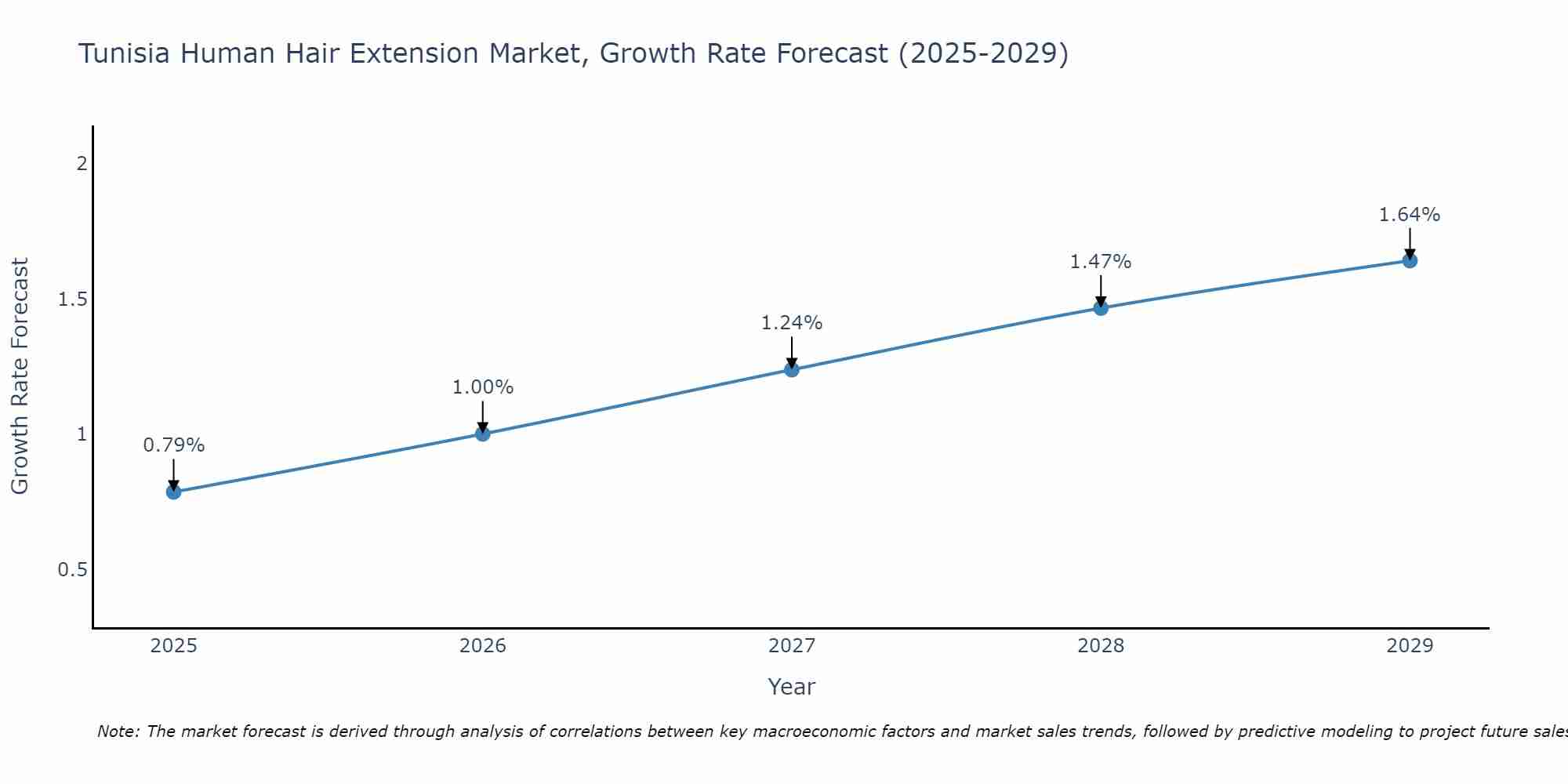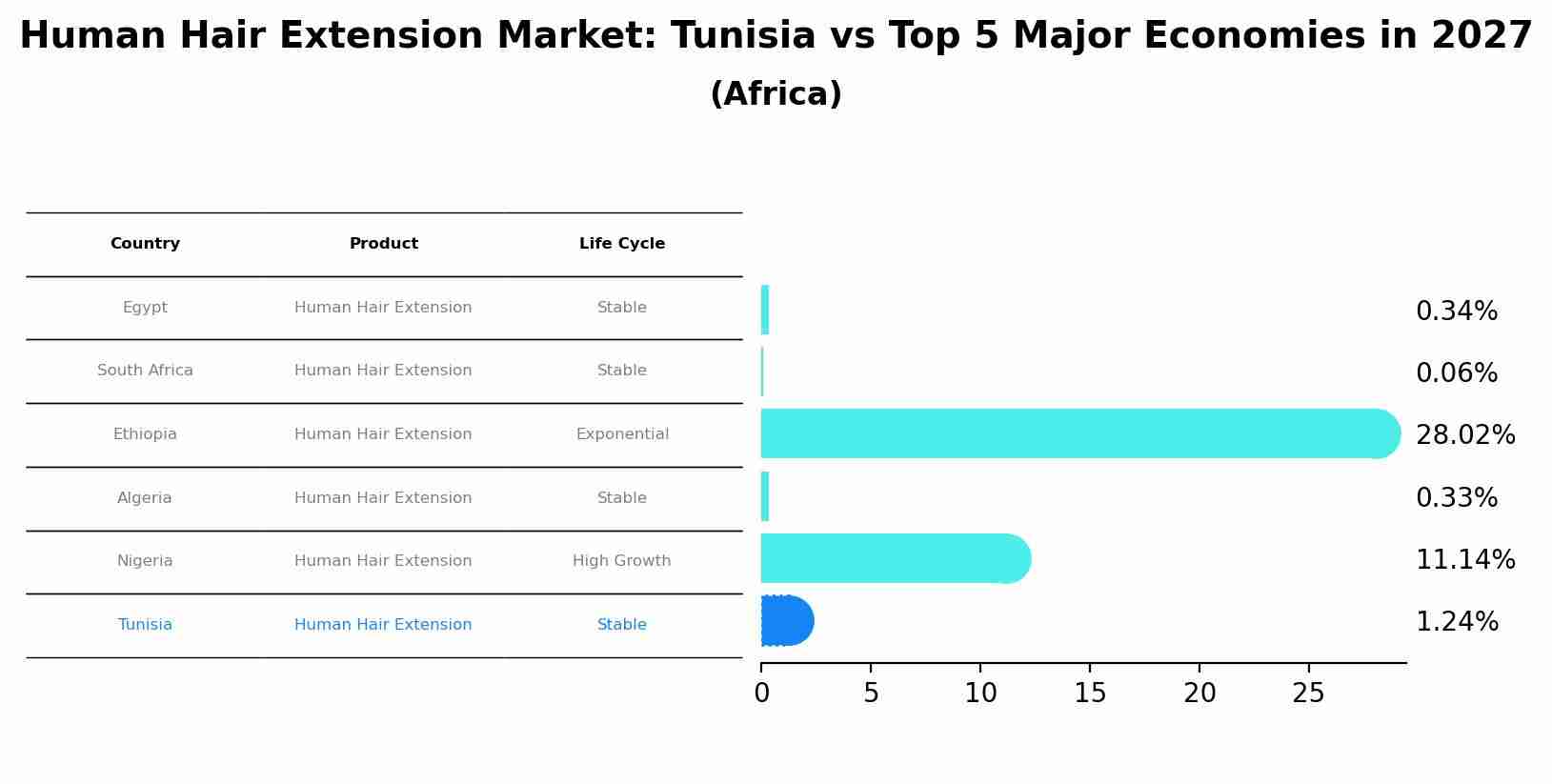Tunisia Human Hair Extension Market (2025-2031) Outlook | Share, Revenue, Value, Industry, Analysis, Forecast, Growth, Size, Companies & Trends
| Product Code: ETC382794 | Publication Date: Aug 2022 | Updated Date: Jul 2025 | Product Type: Market Research Report | |
| Publisher: 6Wresearch | Author: Sumit Sagar | No. of Pages: 75 | No. of Figures: 35 | No. of Tables: 20 |
Tunisia Human Hair Extension Market Size Growth Rate
The Tunisia Human Hair Extension Market is poised for steady growth rate improvements from 2025 to 2029. From 0.79% in 2025, the growth rate steadily ascends to 1.64% in 2029.

Human Hair Extension Market: Tunisia vs Top 5 Major Economies in 2027 (Africa)
In the Africa region, the Human Hair Extension market in Tunisia is projected to expand at a stable growth rate of 1.24% by 2027. The largest economy is Egypt, followed by South Africa, Ethiopia, Algeria and Nigeria.

Tunisia Human Hair Extension Market Synopsis
The Tunisia Human Hair Extension Market is a growing industry driven by increasing demand for beauty products. The market offers a variety of human hair extensions, including clip-in, tape-in, sew-in, and fusion extensions to cater to different customer needs. The market is characterized by the presence of both domestic and international brands, offering a wide range of quality and price options for consumers. Factors such as rising disposable income, changing fashion trends, and a growing focus on personal grooming have contributed to the market`s expansion. Additionally, the availability of various hair types, textures, and colors ensures that customers have a diverse selection to choose from. As the beauty industry continues to evolve, the Tunisia Human Hair Extension Market is poised for further growth and innovation in the coming years.
Tunisia Human Hair Extension Market Trends
The Tunisia Human Hair Extension market is currently experiencing a growing demand for high-quality, ethically-sourced human hair extensions. Consumers are increasingly seeking natural-looking hair extensions that blend seamlessly with their own hair, driving the popularity of Remy human hair extensions. The market is also witnessing a rise in the popularity of tape-in and clip-in extensions due to their ease of use and convenience. Sustainability and environmental consciousness are becoming important factors for consumers, leading to a preference for human hair extensions that are sourced ethically and produced using eco-friendly methods. Additionally, the market is seeing a trend towards customization, with consumers looking for personalized hair extension options to suit their unique styles and preferences. Overall, the Tunisia Human Hair Extension market is evolving to meet the demands of a more discerning and eco-conscious consumer base.
Tunisia Human Hair Extension Market Challenges
In the Tunisia Human Hair Extension Market, challenges include the presence of counterfeit products, limited access to high-quality raw materials, fluctuating consumer demand, and competition from international brands. Counterfeit products undermine the credibility of genuine brands and can lead to customer distrust. Limited access to high-quality raw materials can affect the overall quality of the hair extensions produced locally. Fluctuating consumer demand makes it challenging for businesses to forecast sales and plan production efficiently. Additionally, competition from international brands with established reputations and distribution networks poses a threat to local businesses. Overcoming these challenges may require investing in quality control measures, forging partnerships with reliable suppliers, staying abreast of market trends, and implementing effective marketing strategies to differentiate local brands in the market.
Tunisia Human Hair Extension Market Investment Opportunities
The Tunisia Human Hair Extension Market presents lucrative investment opportunities due to increasing demand for high-quality hair extensions among consumers. With the rising trend of hair styling and beauty consciousness, the market is poised for growth. Investing in the manufacturing and distribution of premium human hair extensions, sourcing directly from suppliers or establishing partnerships with local hair salons, could be profitable. Additionally, offering a diverse range of products to cater to different customer preferences and marketing through social media platforms to reach a wider audience would be beneficial. Collaborating with influencers and beauty professionals could also help in promoting the products and expanding market presence. Overall, the Tunisia Human Hair Extension Market offers potential for investors to capitalize on the growing demand for hair extensions in the region.
Jordan Agar Market Government Policies
The Tunisian government does not have specific policies directly targeting the human hair extension market. However, general regulations related to business licensing, consumer protection, and import/export tariffs will apply to businesses operating in this market. Additionally, there may be regulations related to hygiene and quality standards for the import and sale of hair extensions to ensure consumer safety. It is advisable for businesses in the human hair extension market in Tunisia to comply with these general regulations and standards to operate legally and maintain consumer trust. Overall, while there may not be specific policies targeting the human hair extension market, adherence to existing regulations and standards is essential for businesses in this industry to thrive in Tunisia.
Tunisia Human Hair Extension Market Future Outlook
The Tunisia Human Hair Extension Market is expected to witness steady growth in the coming years due to increasing consumer demand for hair extensions as a fashion accessory and styling solution. Factors such as rising disposable income, changing fashion trends, and the influence of social media are driving the market growth. Additionally, the growing popularity of hair extensions among younger demographics and the increasing number of salons and beauty parlors offering hair extension services are contributing to market expansion. However, the market may face challenges related to counterfeit products, pricing pressures, and competition from alternative hair styling solutions. Overall, the Tunisia Human Hair Extension Market is poised for growth, with opportunities for innovation, product diversification, and strategic partnerships to capture a larger market share.
Key Highlights of the Report:
- Tunisia Human Hair Extension Market Outlook
- Market Size of Tunisia Human Hair Extension Market, 2024
- Forecast of Tunisia Human Hair Extension Market, 2031
- Historical Data and Forecast of Tunisia Human Hair Extension Revenues & Volume for the Period 2021 - 2031
- Tunisia Human Hair Extension Market Trend Evolution
- Tunisia Human Hair Extension Market Drivers and Challenges
- Tunisia Human Hair Extension Price Trends
- Tunisia Human Hair Extension Porter's Five Forces
- Tunisia Human Hair Extension Industry Life Cycle
- Historical Data and Forecast of Tunisia Human Hair Extension Market Revenues & Volume By Hair Type for the Period 2021 - 2031
- Historical Data and Forecast of Tunisia Human Hair Extension Market Revenues & Volume By Human Hair for the Period 2021 - 2031
- Historical Data and Forecast of Tunisia Human Hair Extension Market Revenues & Volume By Animal Hair for the Period 2021 - 2031
- Historical Data and Forecast of Tunisia Human Hair Extension Market Revenues & Volume By Synthetic Hair for the Period 2021 - 2031
- Historical Data and Forecast of Tunisia Human Hair Extension Market Revenues & Volume By Application for the Period 2021 - 2031
- Historical Data and Forecast of Tunisia Human Hair Extension Market Revenues & Volume By Fusion & Pre-bonded for the Period 2021 - 2031
- Historical Data and Forecast of Tunisia Human Hair Extension Market Revenues & Volume By Tap-in for the Period 2021 - 2031
- Historical Data and Forecast of Tunisia Human Hair Extension Market Revenues & Volume By Clip-in for the Period 2021 - 2031
- Historical Data and Forecast of Tunisia Human Hair Extension Market Revenues & Volume By Distribution Channel for the Period 2021 - 2031
- Historical Data and Forecast of Tunisia Human Hair Extension Market Revenues & Volume By Non-Store Based for the Period 2021 - 2031
- Historical Data and Forecast of Tunisia Human Hair Extension Market Revenues & Volume By Store Based for the Period 2021 - 2031
- Tunisia Human Hair Extension Import Export Trade Statistics
- Market Opportunity Assessment By Hair Type
- Market Opportunity Assessment By Application
- Market Opportunity Assessment By Distribution Channel
- Tunisia Human Hair Extension Top Companies Market Share
- Tunisia Human Hair Extension Competitive Benchmarking By Technical and Operational Parameters
- Tunisia Human Hair Extension Company Profiles
- Tunisia Human Hair Extension Key Strategic Recommendations
Frequently Asked Questions About the Market Study (FAQs):
- Single User License$ 1,995
- Department License$ 2,400
- Site License$ 3,120
- Global License$ 3,795
Search
Related Reports
- Portugal Electronic Document Management Market (2025-2031) | Strategy, Consumer Insights, Analysis, Investment Trends, Opportunities, Growth, Size, Share, Industry, Revenue, Segments, Value, Segmentation, Supply, Forecast, Restraints, Outlook, Competition, Drivers, Trends, Demand, Pricing Analysis, Competitive, Strategic Insights, Companies, Challenges
- France Electronic Document Management Market (2025-2031) | Strategy, Consumer Insights, Analysis, Investment Trends, Opportunities, Growth, Size, Share, Industry, Revenue, Segments, Value, Segmentation, Supply, Forecast, Restraints, Outlook, Competition, Drivers, Trends, Demand, Pricing Analysis, Competitive, Strategic Insights, Companies, Challenges
- Portugal Occupational Health & Safety Services Market (2025-2031) | Strategy, Consumer Insights, Analysis, Investment Trends, Opportunities, Growth, Size, Share, Industry, Revenue, Segments, Value, Segmentation, Supply, Forecast, Restraints, Outlook, Competition, Drivers, Trends, Demand, Pricing Analysis, Competitive, Strategic Insights, Companies, Challenges
- Netherlands Occupational Health and Safety Services Market (2025-2031) | Strategy, Consumer Insights, Analysis, Investment Trends, Opportunities, Growth, Size, Share, Industry, Revenue, Segments, Value, Segmentation, Supply, Forecast, Restraints, Outlook, Competition, Drivers, Trends, Demand, Pricing Analysis, Competitive, Strategic Insights, Companies, Challenges
- Belgium and Luxembourg Facility Management Market (2025-2031) | Strategy, Consumer Insights, Analysis, Investment Trends, Opportunities, Growth, Size, Share, Industry, Revenue, Segments, Value, Segmentation, Supply, Forecast, Restraints, Outlook, Competition, Drivers, Trends, Demand, Pricing Analysis, Competitive, Strategic Insights, Companies, Challenges
- Russia Women Intimate Apparel Market (2025-2031) | Strategy, Consumer Insights, Analysis, Investment Trends, Opportunities, Growth, Size, Share, Industry, Revenue, Segments, Value, Segmentation, Supply, Forecast, Restraints, Outlook, Competition, Drivers, Trends, Demand, Pricing Analysis, Competitive, Strategic Insights, Companies, Challenges
- Africa Chocolate Market (2025-2031) | Size, Share, Trends, Growth, Revenue, Analysis, Forecast, industry & Outlook
- Global Hydroxychloroquine And Chloroquine Market (2025-2031) | Industry, Trends, Size, Outlook, Growth, Value, Companies, Revenue, Analysis, Share, Forecast
- Saudi Arabia Plant Maintenance Market (2025-2031) | Industry, Size, Growth, Revenue, Value, Companies, Forecast, Analysis, Share & Trends
- Taiwan Electric Truck Market (2025-2031) | Outlook, Industry, Revenue, Size, Forecast, Growth, Analysis, Share, Companies, Value & Trends
Industry Events and Analyst Meet
Our Clients
Whitepaper
- Middle East & Africa Commercial Security Market Click here to view more.
- Middle East & Africa Fire Safety Systems & Equipment Market Click here to view more.
- GCC Drone Market Click here to view more.
- Middle East Lighting Fixture Market Click here to view more.
- GCC Physical & Perimeter Security Market Click here to view more.
6WResearch In News
- Doha a strategic location for EV manufacturing hub: IPA Qatar
- Demand for luxury TVs surging in the GCC, says Samsung
- Empowering Growth: The Thriving Journey of Bangladesh’s Cable Industry
- Demand for luxury TVs surging in the GCC, says Samsung
- Video call with a traditional healer? Once unthinkable, it’s now common in South Africa
- Intelligent Buildings To Smooth GCC’s Path To Net Zero













